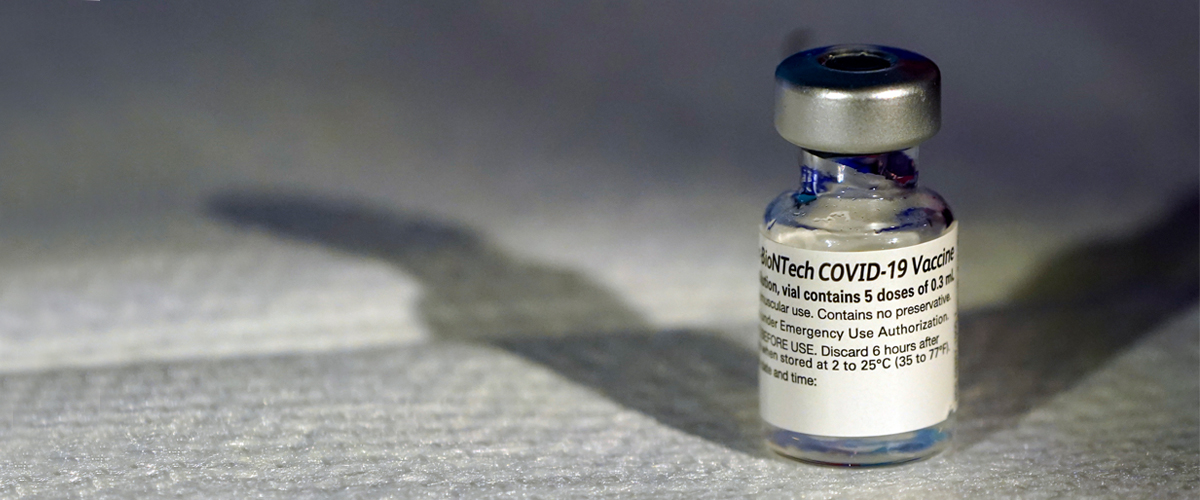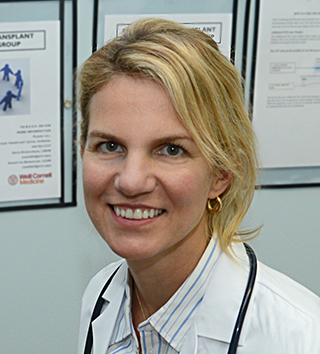COVID-19 Vaccine: Your Top Questions Answered
As the coronavirus vaccine rolls out across the country, an infectious disease expert answers questions about its safety and when it’s likely to be available to the general public.

Contributor/Bloomberg via Getty Images
Hospitals in the U.S. began receiving the first COVID-19 vaccine on December 14 and vaccinating healthcare workers, in the first step of the biggest vaccination campaign in U.S. history. On December 11, the U.S. Food and Drug Administration (FDA) authorized emergency use for the COVID-19 vaccine developed by Pfizer-BioNTech for people 16 years of age and older. A similar vaccine by Moderna and the National Institutes of Health for those ages 18 and older received emergency authorization one week later.
Front-line healthcare workers and nursing home residents are the first groups receiving the vaccines rolling out across the country. For the general public, experts say the vaccine may be widely available in late spring or summer 2021.
Typically, a new vaccine takes years to develop. This vaccine was made in less than a year, an incredible scientific achievement, says Dr. Kristen Marks, an infectious disease specialist at NewYork-Presbyterian/Weill Cornell Medical Center and an associate professor of medicine in the Division of Infectious Diseases at Weill Cornell Medicine. “This achievement was possible because scientists leveraged what they learned from past outbreaks of similar coronaviruses and studies, and production of the vaccine was pursued simultaneously with clinical trials, rather than waiting for their completion,” she says, adding that the clinical trials have been extensive and thorough and that no steps were skipped in the trials.
“This is definitely the most important tool for ending the COVID-19 pandemic,” says Dr. Marks, who is leading the Moderna clinical trial at NewYork-Presbyterian/Weill Cornell Medical Center. “Widespread acceptance of this vaccine could allow us to go back to a relatively normal life.”
Health Matters spoke with Dr. Marks, who answered common questions people have about the COVID-19 vaccine.

Dr. Kristen Marks
Is the vaccine safe?
The data that’s been released shows that these two vaccines are very safe. Huge clinical trials are being conducted across the globe with approximately 44,000 participants for the Pfizer vaccine and more than 30,000 for the Moderna Phase 3 trials. The FDA used the data from these trials to evaluate the vaccine’s safety and efficacy to make the emergency use determination. The vaccines will continue to be studied — under the Centers for Disease Control and Prevention’s (CDC) surveillance and other means — to learn about longer-term safety and effectiveness.
Is the vaccine effective?
Both the Pfizer-BioNTech and Moderna vaccines showed about 95% efficacy. That’s a staggering efficacy and it far exceeded everyone’s expectations!
How does the vaccine work?
Both the Pfizer and Moderna vaccines are similar in how they work. They contain the mRNA code for a viral protein. This code allows the person’s own body to make the protein that then stimulates their immune system to create antibodies to help prevent illness. The vaccine is injected into the arm muscle and two doses are required to be effective.
Why two doses?
Scientific studies suggest that two doses for the Pfizer and Moderna vaccines are very important for achieving the antibody response to provide protection and create lasting immunity. For the Pfizer-BioNTech vaccine, the second dose is administered 21 days after the first dose. For the Moderna vaccine, it’s 28 days after. The second dose must be the same type as the first one you received. At the time of your first vaccination, you will be scheduled for your second vaccination. Some of the vaccines being studied require one dose.
Are there reactions to the vaccine?
It’s common to have some mild reactions after a vaccination. Not everyone will experience these, but some may. The most common reaction reported is soreness at the injection site. Other reactions may include fatigue, headache, muscle aches, joint aches, and, less commonly, fever. These reactions are normal and are a sign that your body is building immunity. If they occur, they tend to be a little worse after the second dose of the vaccine but should go away within a couple of days. It’s important to monitor your body and stay well hydrated. You can keep ibuprofen or acetaminophen handy in case you need it, but it’s not necessary to take it in advance of the vaccine. Contact your doctor or the vaccination provider if any of these symptoms do not go away or if other symptoms are experienced.
Is it possible to contract COVID-19 from the vaccine?
It’s impossible for the vaccine to give you COVID-19 because it does not contain the live virus or even inactivated virus. It’s a common misconception and fear, but there is no possible way to contract COVID from the vaccine.
If after receiving the vaccine you are experiencing symptoms that last more than a couple of days, like a fever, particularly if it is accompanied by cough, I do advise getting tested for COVID just in case you happen to have been exposed to the virus prior to getting the vaccine.
It’s impossible for the vaccine to give you COVID-19 because it does not contain the live virus or even inactivated virus. It’s a common misconception and fear, but there is no possible way to contract COVID from the vaccine.
Dr. Kristen Marks
Is the vaccine free?
Yes. The vaccine is provided at no cost. Vaccine providers can charge a fee for giving the vaccine, but it’s expected to be covered by insurance, or for those who are uninsured, by a government fund, according to the CDC.
When will the vaccine be available?
Front-line healthcare workers and nursing home residents and staff are largely the first who are receiving the vaccine. A committee of experts organized by the CDC called the Advisory Committee on Immunization Practices (ACIP) has issued guidance for how states should plan and deploy the COVID vaccine within their jurisdictions. So, each state will take into consideration the ACIP’s guidance and interpret it in the context of their own local situation and what is best for their state. The ACIP has published recommendations for a phased rollout of the vaccine. It recommends that adults 75 and older and “frontline essential workers,” such as teachers, first responders, and grocery store employees, be the second priority; and that the third priority focus on people ages 65 to 74, plus those 16 to 64 years old with high-risk medical conditions, and essential workers not included in the second phase, including restaurant and construction workers.
Should I still get vaccinated if I’ve had COVID-19?
Yes. At this time, there isn’t enough information available to say if or for how long after infection someone may be protected from getting COVID-19 again. The current recommendation by the ACIP is to receive the vaccine even if you’ve already had COVID. It is not recommended to take the vaccine during the period of COVID illness itself.
Do I still need to wear a face covering and practice social distancing if I get the vaccine?
Yes. Until we know more about how long someone is protected after receiving the vaccine, people should continue to use all tools to help prevent the spread of COVID-19, including wearing masks and practicing social distancing, to be safe. As vaccines are distributed more widely some of these requirements may change.
Who should NOT get the vaccine?
According to the ACIP, if you have had a severe allergic reaction to any of the vaccine’s ingredients, it’s not recommended that you receive that specific vaccine at this time; and if you had a severe reaction after the first shot, you shouldn’t get the second shot. That being said, the vast majority of people with a history of allergies can receive it safely. Until we have more information, those with a history of a severe allergic reaction like anaphylaxis to any vaccine or injectable medicine should be cautious about getting the vaccine. If that applies to you, discuss with your provider to decide how to proceed. In addition, the ACIP recommends that everyone should be observed for 15 to 30 minutes after the vaccination.
For women who are pregnant, the American College of Obstetricians and Gynecologists recommends that the vaccine not be withheld from them, and that a conversation with their doctor prior to vaccination is not required but may be helpful in guiding their decision. The Moderna vaccine is for adults 18 and older, though trials have begun on children ages 12 to 17. The Pfizer-BioNTech vaccine won’t be available to children under 16 at this time; Pfizer is currently testing it in children as young as 12, and other studies will include even younger children. Before you receive the vaccine, tell the healthcare professional administering the vaccine if you have a fever, have an allergy, are immunocompromised or are on a medicine that affects your immune system. While people who are immunocompromised will be offered the vaccine, we do not yet know how well it works. They should continue to rely on other measures like masks and social distancing for protection. If you recently had another vaccine, for example for influenza, you should wait 14 days before taking this vaccine.
Public health officials recommend a vaccine as the first and best way to protect against COVID-19. “I don’t see the COVID pandemic ending without it; vaccination is a small thing each of us can do to have a huge impact on our community,” says Dr. Marks. “Make sure your friends and family seek out information from reputable sources like the CDC and NewYork-Presbyterian — there is a lot of misinformation out there. NewYork-Presbyterian is committed to providing accurate and up-to-date information on the COVID vaccine.”
Kristen Marks, M.D., is an infectious disease specialist and attending physician at NewYork-Presbyterian/Weill Cornell Medical Center and an associate professor of medicine in the Division of Infectious Diseases at Weill Cornell Medicine. She is also the co-director of the Cornell HIV/AIDS Clinical Trials Unit, where she conducts several treatment studies related to HIV and hepatitis viruses. She currently leads the Moderna clinical COVID-19 vaccine trial at NewYork-Presbyterian/Weill Cornell Medical Center.
Additional Resources
Learn more about coronavirus clinical trials at NewYork-Presbyterian, Columbia University Irving Medical Center, and Weill Cornell Medicine.
